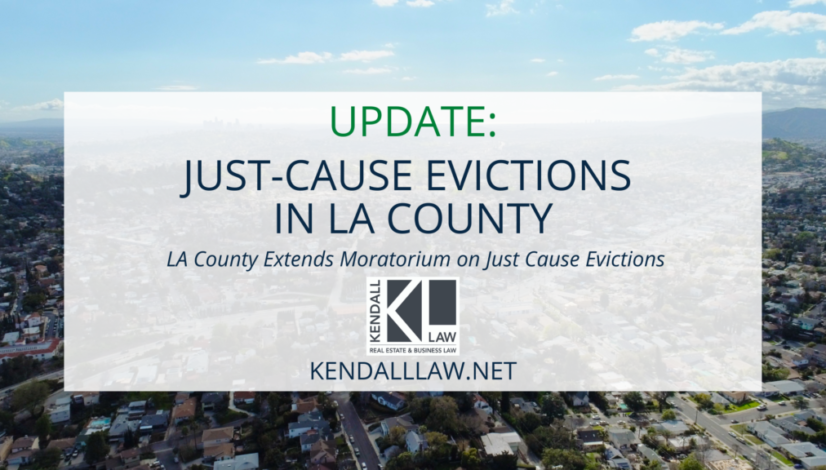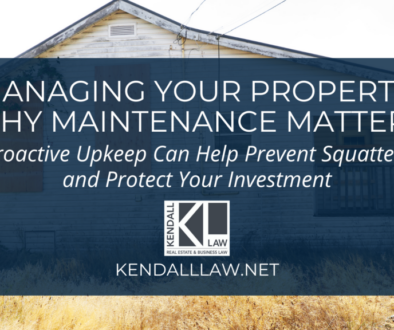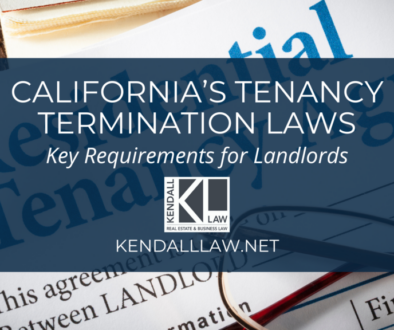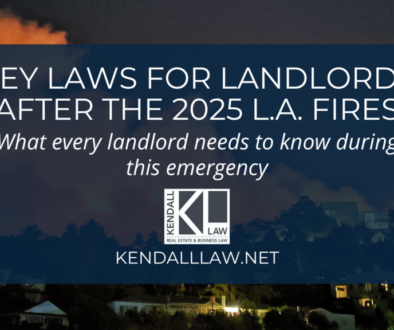Update: Los Angeles County Extends Moratorium on Just Cause Evictions
On September 28, 2021, the LA County Board of Supervisors passed the County Tenant Protection Resolution in effect through January 31, 2022, as to the sections that were not preempted by state law (Non-Payment of Rent). The resolution indicates that the Board will reevaluate the need for further extension or repeal every 30 days.
What does this mean for owners and managers in Los Angeles County?
As of October 1, 2021, for all rental properties in LA County (except properties located in the City of Los Angeles) tenants must pay rent due from this point on. If rent is not paid, owners and managers can serve a three-day notice (see last week’s blog post).
As for all other no-fault evictions, owners’/managers’ hands are tied except for evictions on the grounds of owner occupancy. However, the County has added certain requirements to evict for owner occupancy.
These restrictions apply to ALL residential rental properties within Los Angeles County, including incorporated and unincorporated areas:
You CANNOT terminate for nuisance based on having unauthorized pets or occupants whose presence is necessitated by or related to COVID-19 emergency.
Denial of Entry as grounds for termination. A landlord can enter to remedy a condition that substantially endangers or impairs the health and safety of the residential tenant or others in the vicinity of the unit or if the residential tenant is causing or threatening to cause damage to the rental unit. To be able to enter on these limited grounds, the landlord cannot permit the entry of any person who they believe is a carrier of COVID-19 and must ensure that appropriate social distancing, cleaning, and sanitation measures are taken to protect the tenant. The tenant has the right to revoke permission if the landlord is not observing appropriate social distancing, cleaning or sanitizing. Landlord must leave immediately if the permission is revoked.
This moratorium does not apply where the eviction is concerning safety or habitability of rental units or where the tenant’s occupancy is otherwise a threat to the public health and safety as determined by the Court.
As of July 1, 2021, a landlord can terminate a tenancy for themselves or their family member to occupy up to two units of the following types: single family home; mobile home space; condominium; two units within a duplex; and/or two units within a triplex. However, this is subject to the following conditions:
- Property was purchased prior to June 30, 2021;
- Residential tenant has been and is able to pay the rent and does not have a Financial Impact Related to COVID-19;
- Must first try to occupy a vacant unit and if nothing vacant must displace the most recently occupied unit;
- Must be a natural person and own at least 50%;
- The person to occupy is similarly situated to the tenant: i.e. if the tenant is 62, the person moving in must be 62; if the tenant has a disability then the person moving in must have a disability, etc.;
- Must give 60-day notice that the landlord will be occupying the unit as principal residence and provide a copy of the notice to the Department of Consumer and Business Affairs with proof of timely service of the residential tenant. The landlord shall provide an extension of time if anyone has been diagnosed or suspected to have COVID-19 within 14 days of the moveout;
- Landlord must reside in the unit for at least 36 months;
- Landlord pays relocation assistance as required under local laws or if no requirements then pays as set forth in Section 8.52.110 of County Code and DCBA’s policies (8.52.130 requires a landlord to pay $500 to cover moving expenses; $1,000 for anticipated rent increase);
- Not less than 60 days prior to the final date of the tenancy, the landlord must disclose the names of the eligible individuals that will occupy the unit on a form approved by the DCBA. The DCBA may contact the individual at any time in the 36 months to verify residency;
- And if an RSO (Rent Stabilization Ordinance) property, the Landlord is following RSO codes.
The non-payment of rent protections under the County rules has been extended for COMMERCIAL PROPERTY ONLY. Residential is to abide by state law. A Rent Increase Freeze is in effect on all City of LA (RSO) properties only.
It should be noted that the City of Los Angeles has its own rules concerning non-payment of rent and no-fault eviction notices. For more information in this regard, please review our blog post here.
Need further explanation? We’re happy to help!
Kendall Law continues its commitment to monitoring ongoing changes at the Federal, State and Local levels regarding the eviction moratorium. However, the laws change frequently and this article may not reflect current rules. Please do not rely on this article when making legal decisions. Reach out to Kendall Law to set a consultation regarding your particular matter before taking any action.
Kendall Law is here to help. Contact us or call (310) 619-4941.
Author: Eileen Kendall





